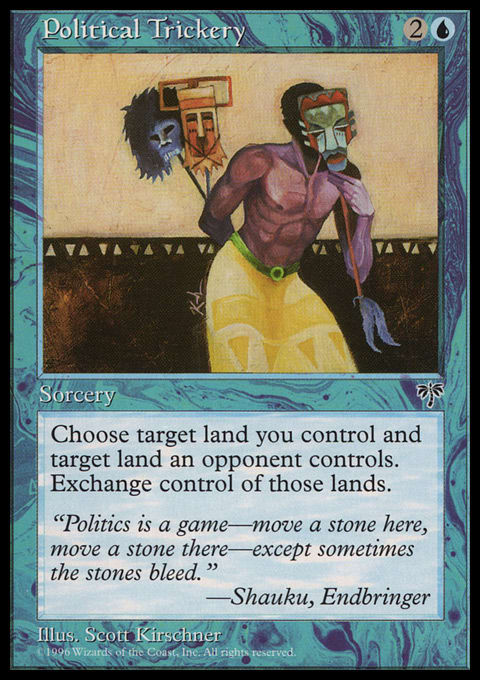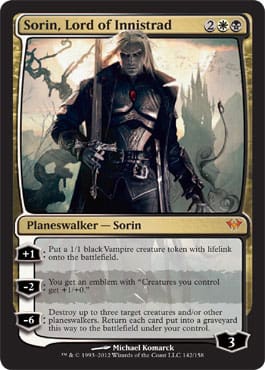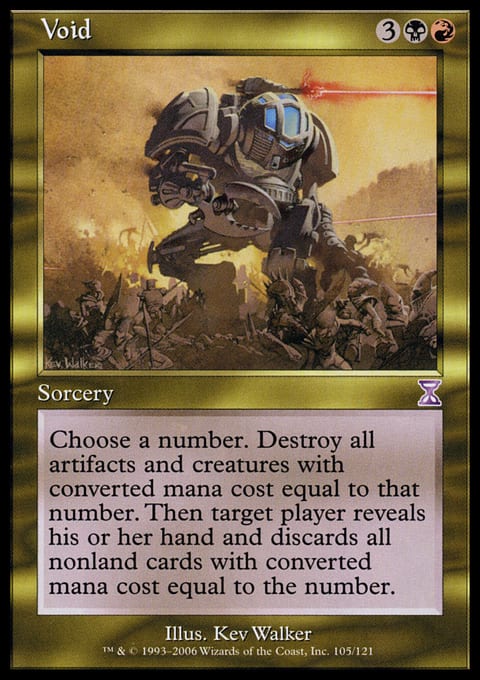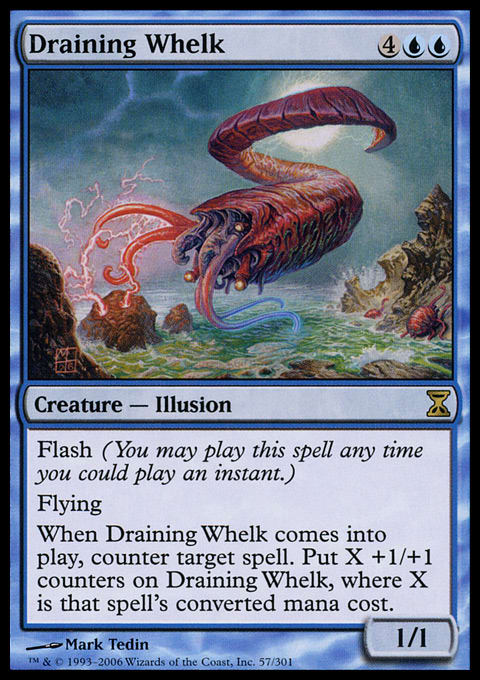A writer from another site recently wrote, “At its heart, Commander is a political format.” Long-time readers won’t be surprised to learn that this completely pissed me off, and after kicking several dozen puppies, I decided to put this idea, which I believe is the number one multiplayer myth, to the test.
Everyone can agree that Magic is a strategy game. Duels are always described in strategic terms; I've never heard a pro complain that he or she lost in the finals of a Pro Tour because of politics. Multiplayer Magic is still the same game; the strategy1 is made much more complex with each new player you add, and politics can play a role in multiplayer, but it isn’t nearly as relevant to multiplayer as most people think.
I can prove this very easily: Next time you hear someone saying that multiplayer is a political format, ask that person what he or she means by “politics,” and I guarantee you that the person will not have a coherent definition that is distinct from strategy.
Why is this important? Because a lot of people don’t play multiplayer because of this myth that multiplayer is political. Debunking this myth will do a lot to improve the popularity of our favorite formats. That’s why I offer this politics test as a public service to the multiplayer community. If you can distinguish between politics and strategy, you will be a much better advocate of casual play.
Question 1
In a four-player game, Andy has a 4/4 trampler, Bobby has a 2/5 Spider, and Charley is stuck on two lands. Last round, you were smacked by Andy, and this round, you still don’t have a blocker, but you do have a Crown of Empires. At the start of Andy’s combat step, you could tap down his attacker, but instead, you choose to tap down Bobby’s Spider. As you expected, Andy takes advantage of this opportunity and attacks Bobby.
Question: Is this politics?
. . .
. . .
. . .
. . .
Time’s almost up . . .
. . .
. . .
. . .
. . .
Pencils down please.
Answer: No.
This play is a bit of a gamble, as Andy could still attack any of his three opponents, including you, but it’s clearly a strategic gamble, and in the early game, I’m prepared to take this kind of chance.
If you were playing a duel, figuring out what your opponents will do based on their interests and capabilities is considered strategy. For example, in a duel, you will often attack an opponent who could double-block your creature and kill it, whether or not you have spot removal in hand, if you know that your opponent is less worried about the damage than he is worried about a combat trick giving you a two-for-one.
Look at it from Andy’s perspective: He currently has no way to get around the 5-toughness blocker, so if you give him his only chance to damage Bobby, there is a good chance he will take advantage of it.
Andy damaged you early, but it was probably a matter of opportunity rather than a desire to see you out of the game first. If there is some compelling reason for Andy to kill you first, obviously presenting him with the opportunity to attack someone else won’t be effective, but in the early game, there is usually no reason for him to target you exclusively. That’s why this kind of play can make good strategic sense in multiplayer.
Question 2
In a three-player game against Kevin’s W/B tokens deck and Josh’s red-deck-wins deck, I was playing my Venser deck. Kevin brought out some critters and an early Sorin, Lord of Innistrad, and Josh led with a Stromkirk Noble and a Grim Lavamancer. I had a couple of early blockers and a Swords to Plowshares in hand, and I had a decision to make: hold the removal, Swords the Lavamancer or Noble, or get rid of one of Kevin’s two 2/1 Spirit tokens (due to a Sorin emblem).
My first thought was that the Lavamancer had to go because it was stopping me from playing a Fog Bank, and it could potentially jeopardize Venser when I got around to playing him. But I decided to Swords Kevin’s blocker at the start of Josh’s attack step, and as expected, he Lavamancered the other blocker and swung at Sorin with the Noble.
Question: Is this politics?
. . .
. . .
. . .
. . .
Answer: No.
Look at it from Josh’s perspective. He was going to have trouble with both Kevin’s blockers (protecting Sorin) and my Wall of Omens. Without a removal spell, he couldn’t get through Kevin’s defenses, so his most profitable play was to attack me with the 2/2 Noble and then exile his graveyard to kill my Wall with the Lavamancer if I blocked.
However, his biggest threat overall was obviously Sorin because lifelinking blockers are like Kryptonite to an aggro deck. If I gave Josh the opportunity to smash Sorin, that would become his most profitable play. So eliminating one minor threat (the token) would lead to the swift removal of another threat (Sorin) and keep a counter off the Noble. In addition, if I could get Josh to focus on Kevin with his Lavamancer, he wouldn't have enough fuel left in his graveyard to use it against me—or maybe Kevin would get rid of it. If that isn't card advantage from my removal spell, I don’t know what is.
Was it politics that I basically knew Josh would attack me if Kevin’s blocker were still in place? No, of course not; that’s exactly the kind of strategic logic that we use in a duel to predict which of our opponents’ critters will attack us. Using the same thinking to predict whom our opponents’ critters will attack in multiplayer is no less strategic.
Therefore, it can't be politics to know, or to be fairly certain, what it would take to change a player’s decision-making and to act on it. It might be extremely tricksy, but it’s strategically tricksy and not politically tricksy.
Once again, using my removal on a card that doesn’t directly threaten me in order to change my opponent’s decision-making is a bit of a gamble, but then, probability will always play a role in Magic. Just like knowing the odds in poker makes the game less risky, understanding your opponents’ threat assessment allows you to successfully make plays like this. In this game, the damage that Josh and Kevin did to each other allowed me to eke out a win against two decks that I couldn't have handled in duels.
Question 3
With eight players at the table, we decided to roll for teams and play four-way Two-Headed Giant. Unfortunately, the die roll put two of the strongest decks on the same team, and they were able to take advantage of slow starts from everyone else. They (John and Ryan) were walking away with the whole game. Post-sweeper, my partner Tommy had the only creature that could attack, and I drew a Void. Our only chance to win was if the other two teams also devoted all of their resources to smashing John and Ryan, so I played Void to take out the maximum number of their permanents, and Tommy swung at them.
Question: Is this politics?
Answer: No.
If I had tried to persuade or cajole everyone to act in concert with me, that would have been politics. If I had threatened to use Void to kill someone else’s best stuff unless they attacked John and Ryan, that would have been politics. However, in this case, I played as though my opponents would follow suit because it was my only chance to win. As it happens, their threat assessment aligned with mine, and they also saw that the only road to victory was through John and Ryan. Unfortunately, they realized it too late, and we weren't able to balance against them, but I had a better chance of winning with the play I chose than burying my head in the sand, trying to remain inconspicuous, or getting my licks in against a weaker team.
This kind of play should be very familiar to anyone who plays duels seriously. Sometimes, your opponent has you by the short hairs and you only have one out in your deck; in that case, you have to play as though you will draw your out in time (cf. Lightning Helix; Windmill Slam). In multiplayer, it’s similar—if your only out is to have everyone join you in balancing against a particular threat, you have to play as though they will.
Question 4
A lot of people talk about “political” cards like Propaganda and Ghostly Prison, but are they really political?
I tap out to play Thraximundar and announce that I’m attacking Kevin. Kevin reminds me that he has Propaganda in play and I don’t have enough mana to pay for it, so I say something profane about his mother and attack someone else instead.
Question: Is this politics?
Answer: No.
What we attack with in a duel, and whom we attack in multiplayer, are complex decisions. Cards like Propaganda just add a little more complexity to the process. Propaganda makes your opponents pay an extra cost to attack you—in addition to the normal costs of potentially losing creatures to combat and the opportunity cost of not having the creature available to block with—but the costs that Propaganda imposes are exactly the same in a duel as in multiplayer. The difference is that those opponents still have the option of attacking other players, but that is an example of strategic complexity, not politics.
For that matter, if I have Glissa, the Traitor in play and I hold her back to block, is that a political ploy? After all, she is a ferocious blocker and might make my opponents attack someone else, so that sounds political, right? Of course not!
Question 5
I have a Primeval Titan and a Herald of Leshrac in hand, and I choose to play the Herald instead of the more powerful Titan because I think it is less likely to draw removal.
Question: Is this politics?
Answer: No.
How many times have you played the weakest of your available creatures in a duel (especially in Limited) because you suspect your opponent is holding removal? It’s a completely normal strategic decision. Anyone who says that playing around removal is strategy in a duel but politics in multiplayer doesn’t know what he’s talking about.
Question 6
A long time ago, in a six-player game far, far away, I was on the back foot and trying to stabilize. An unblockable Zur the Enchanter was beating me down, and Jaya Ballard, Task Mage was repeatedly blowing up the world. I cast Seedborn Muse for the third time, and one of my opponents killed it for the third time. Then, Zur attacked me, putting me on 12 Commander damage and pulling out an Oblivion Ring to drop on someone else’s permanent.
Next turn, I tried to play an Angel of Despair to protect myself from Zur, but Intet, the Dreamer cast Draining Whelk on it. Zur’s next attack put me one more hit away from death and dropped my life down to the low teens, and a Molten Disaster from Jaya Ballard finished me off.
That loss left me with a bad taste in my mouth—I felt that I was ganged up on.
Question: Is this politics?
Answer: No.
Sometimes, you can feel pretty helpless when the game turns against you and your opponents each take a little piece of you until there’s nothing left. But that doesn’t mean that you can blame your loss on politics or ganging up.
In this game, everyone had his or her own reasons for taking a bite out of me. Three different players each killed the Seedborn Muse because each of them decided on his or her own that it was a threat (and they were right!). Zur needed to fetch an O-Ring for a threatening permanent, and I was the only person open to attack. Intet needed to put a blocker up, and an 8/8 Draining Whelk got the job done, and he had no way of knowing that my Angel was going to leave his stuff alone. Finally, Jaya was able to blow up a bunch of stuff and bring everyone down to a more manageable life total with the Disaster. It gave her significant card advantage and removed a number of threats, including me; it was the right play for her regardless of whether it finished me off.
In short, each of my opponents made a series of plays, each of which was good for that player and bad for me. I can't fault them for that—furthering your own interests at the expense of your opponents is at the heart of any strategic game. There was no joint declaration of aggression, no whispered conversations of how to take me out, and no ganging up, whatever that means.
In fact, I think that we need to remove the phrase “ganging up” from the multiplayer lexicon. Every time I hear someone use it, it’s always in the context of unjustified whining about how unlucky he or she was to lose—as though it is somehow unusual to be attacked by more than one person in a multiplayer game!
CliffsNotes
Received wisdom tells us that a lot of what we do in multiplayer is political; as is so often the case, though, the received wisdom is wrong.2 All of the situations described above are real, and I’ve heard plays like them described as political time and again. However, it should be clear that they aren’t political at all. Things like prioritizing our attacks and spells, predicting what our opponents will do, and managing our resources are fundamentally the same in multiplayer and duels, which makes them strategic rather than political.
This issue is important to me; I wrote a three-part series trying to figure out where strategy ends and politics begins, and I concluded with what is to my knowledge the only comprehensive and concise definition of politics in the vast world of Magic interwebz. The reason it’s important is that so many people sneer at multiplayer because they believe the outcome is mainly determined by politics rather than good play or good deck design. If we as casual players accept this language, we’re implicitly admitting that we aren’t as good at strategy as tournament players, when in fact, I think we can be better because of how rich and complex multiplayer strategy can be.
1 Of course, I know that there is a difference between strategy and tactics, but I don’t think it’s a particularly important distinction when the majority of Magic players aren’t even certain that strategy is the main element of multiplayer. Let’s put the politics–strategy question to rest before addressing the strategy–tactics divide.
2 I suspect that’s because we received this so-called wisdom from the tournament crowd; Spikes and otherwise-duel-oriented players who have an unpleasant experience in multiplayer sometimes look for an excuse, and the ephemeral concept of politics is the easiest scapegoat. Only a few seem to be wise enough to realize that they are playing in a much more complex strategic environment and that they have to expect a different outcome from the relatively simple strategic interactions of a duel.

























